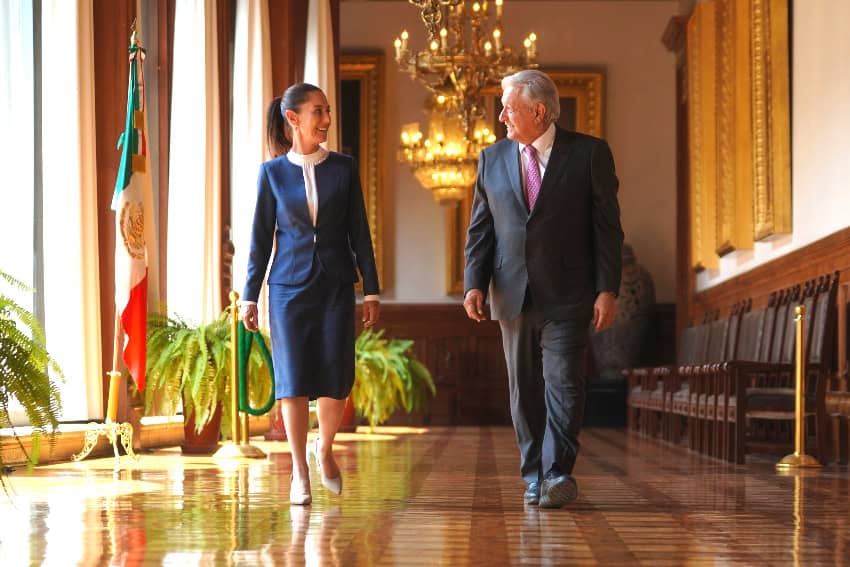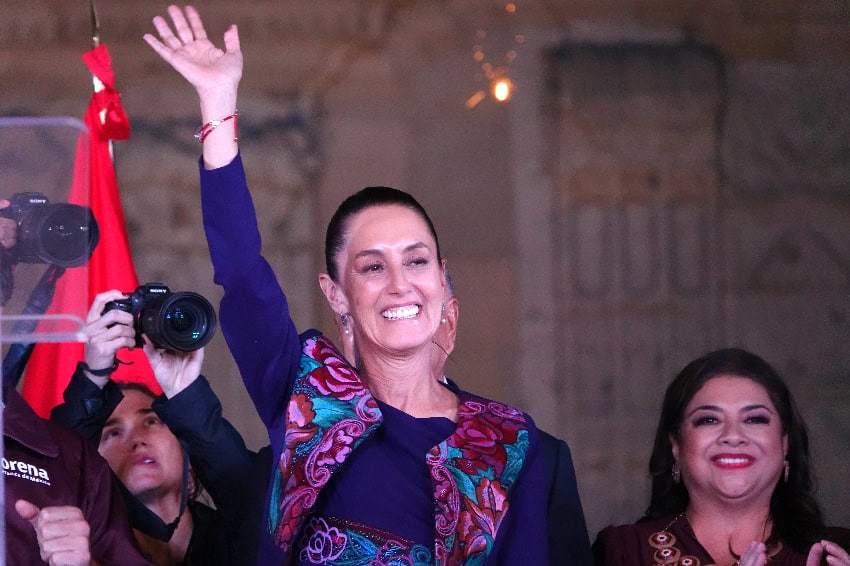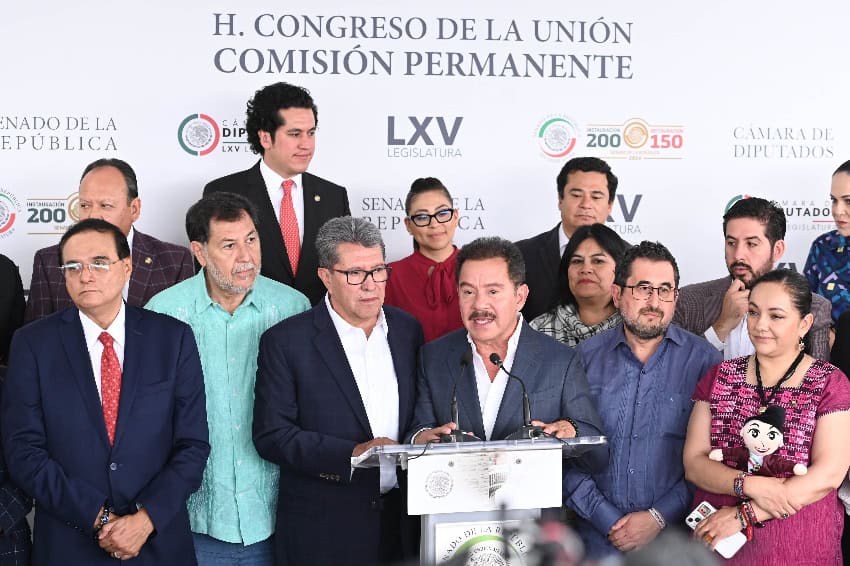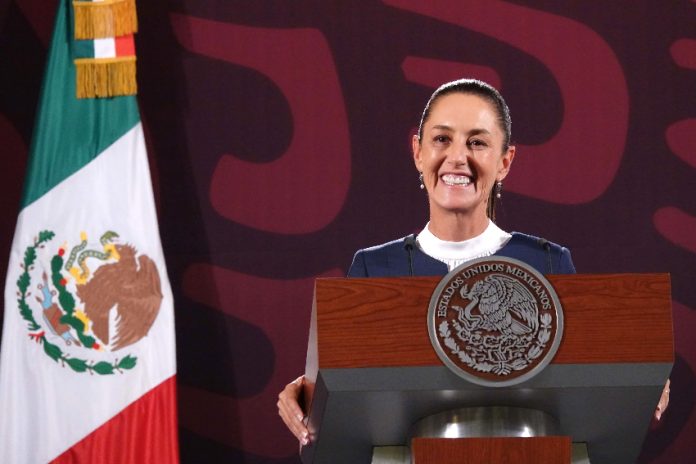President-elect Claudia Sheinbaum said Monday that a controversial plan to allow citizens to directly elect Supreme Court justices and other judges would be among the first constitutional reform proposals to be considered by Congress when recently-elected lawmakers assume their positions in September.
She said there would be “broad consultation” before the judicial reform proposal is discussed by Congress, but was unable to stop the Mexican peso from sliding as she spoke about the plan that President Andrés Manuel López Obrador (AMLO) sent to Congress earlier this year.

Sheinbaum, who won the June 2 presidential election in a landslide, held a press conference late Monday afternoon after what she described as a “very emotional, historic and important meeting” with López Obrador, her political mentor since she served as environment minister in his Mexico City government in the early 2000s.
AMLO is an outspoken critic of Mexico’s judiciary, claiming that it serves Mexico’s corrupt elite rather than the majority of Mexican people.
Sheinbaum told reporters that she would announce a gender-balanced cabinet next week, that she would meet with a delegation of United States government officials on Tuesday and that she intended to accompany AMLO on trips to inspect the current government’s infrastructure projects, such as the Maya Train railroad.
But her main focus — and the topic reporters were most interested in — was the package of constitutional reform proposals the current president submitted to Congress in February.

The 61-year-old president-elect said that the proposed judicial reform as well as proposals to increase pensions for teachers and other public workers, and to prohibit the re-election of all politicians would be the first proposed constitutional changes to be considered by the new Congress.
Sheinbaum, who will take office on Oct. 1, said she expected those reforms to pass Congress “at least in the first months” after the new Congress is sworn in on Sept. 1.
She said that other reform proposals sent to Congress by AMLO would be considered at a later date.
Sheinbaum also said she would put forth two of her own constitutional reform proposals — one that would ensure that all women aged 60 to 64 receive government financial support and another that would guarantee educational scholarships for all public school students.

She said that those initiatives would be a priority as well.
“For the first time we’re going to recognize the work of Mexican women,” the president-elect said after noting that women usually do the majority of household chores.
Sheinbaum, who will be Mexico’s first female president, advocated “a very broad discussion in the entire country” before the different reform proposals are considered by Congress.
In the case of the proposed judicial reform, bar associations, university law faculties, Supreme Court justices, judges and judicial workers should participate in the debate, she said.
Sheinbaum said that people need the opportunity to truly understand Mexico’s judicial system and the proposed reform. She added that López Obrador agreed with the plan to subject his proposed reforms to debate.
Sheinbaum didn’t say whether she would accept modifications to the proposal judicial reform, but stressed that the debate will focus on the initiative as sent to Congress by the current president.

Asked about opposition parties’ positions on the proposals, Sheinbaum simply said they have the right to disagree with them.
The proposed judicial reform and separate proposals to disband a number of government autonomous agencies and make changes to Mexico’s electoral system have spooked markets since it became clear from the June 2 election results that Morena would be able to approve constitutional changes with little or no negotiation with opposition parties. Critics say that the proposals will reduce checks and balances on executive power.
Final election results indicate that Morena and its allies have a two-thirds majority in the Chamber of Deputies, allowing them to pass constitutional changes without opposition support, while they are just a few votes short of a supermajority in the Senate. Morena national president Mario Delgado has expressed confidence that gaining the support of a few opposition lawmakers to approve constitutional reforms will not be an overly difficult task.
When Morena’s leader in the lower house of Congress said last week that the ruling party would seek to hold a vote on the proposed judicial reform in September, the peso promptly took a nosedive.
Sheinbaum’s remarks on Monday had a similar effect, with the peso falling as much as 1.8% to 18.58 to the US dollar after she spoke, according to Bloomberg. The peso was trading at 18.50 to the greenback at midday Mexico City time on Tuesday, about 8% weaker than its pre-election level.
Specifically asked whether she was concerned about the volatility of the peso, the president-elect said she didn’t believe the discussion and eventual approval of the judicial reform would have a negative impact on the currency.

“The president will leave us with very good finances” and the Mexican economy is in “very good” shape, Sheinbaum said.
She declined to disclose whether she would live in the National Palace as president, as AMLO does, or whether she will follow in her predecessor’s footsteps and hold weekday morning press conferences colloquially known as mañaneras.
In other remarks, Sheinbaum committed to having “very good” relationships with state governments, a majority of which are led by Morena governors, and pledged to maintain support for the Plan Sonora renewable energy initiative.
She also said that her meeting with López Obrador would be her first “of many others” as president-elect.
“I’ve always said, it’s an honor to be with Andrés Manuel López Obrador. We’re part of this great project of transformation of our country,” Sheinbaum said.
Mexico News Daily
